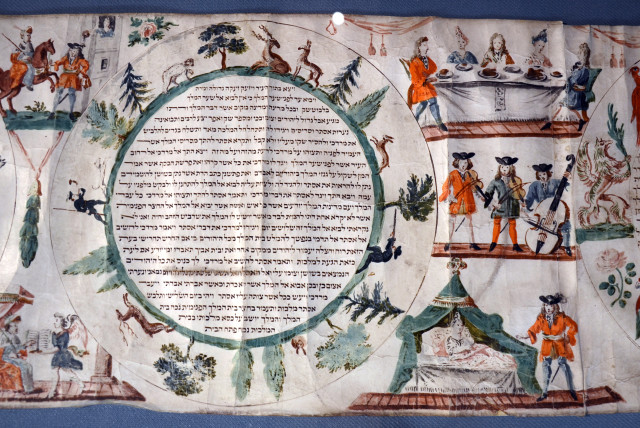Purim: Why is the book of Esther holy if God isn't mentioned?

When you look back on the Book of Esther, it is so easy to see divine providence pulling the strings of this farce.
The Scroll of Esther is said to be the last book added to the biblical canon. It is an odd, improbable story, farcical in nature, filled with absurd, exaggerated descriptions of the king and court, and stands out as one of the few books in the Bible that omits the name of God.
The story tells us of the improbable rise of Esther, a regular Jewish subject of the Persian Empire, to become the wife of Ahasuerus, the Persian king. Her uncle, Mordechai, warns her to keep her Jewish ancestry a secret. At the same time, the wicked, Jew-hating Haman, viceroy of the empire, devises a plan to kill all the Jews in all of the empire’s 127 provinces. All of this with the king’s knowledge and approval. (As in many matters of state, a nice payoff to the crown is made by Haman in order to get what he wanted.)
Just at the right time, Esther reveals her true heritage and begs the king for a reprieve of Haman’s wicked decree. Out of love for Esther, Ahasuerus reverses his decision, saves the Jews, and has Haman hanged on the very tree he prepared for his nemesis, Mordechai.
While the story can be read on the most basic level as a classic story of reversal of fortunes, this is not why it is included in the Bible.
Let us remember what the Bible is. It is the library of the Jewish experience with God. Composed over 1,000 years, it is the story of how God interacts with us and how we interact with Him. To sum it up in a word, it is theology. It may take the form of law, lore, poetry, and history, but it is one thing and one thing only – theology. Even the genealogy tables are not meant to share pedigree but are included to teach us theology.
Which raises the question: How does the story of Esther teach us theology without even mentioning God’s name?
As mentioned, the Book of Esther is the last book included by the rabbis in the cannon. Keep in mind that the Jewish bookshelf at the time had many, many more books than what we find in the Bible. Some of them are referenced in the Bible but were lost to history; others didn’t make the cut but were preserved by the Christians, usually in their Greek form.
Perhaps the most famous of these is the Book of Maccabees, which, while considered canonical by the Catholic Church as part of their Old Testament, was ignored by the rabbis and excluded from the Tanach.
So what was it about the Book of Esther that not only made the rabbis include it but mandated its public reading every year both on the night of Purim and the next morning?
I THINK the book serves as a final message to the Jewish people.
After the people’s first meetings with God, God proved Himself to be a bold presence in the life of the people. God made His splash with huge national miracles that were meant to both dazzle and impress. Plagues of blood and frogs against the Egyptians were meant not only to punish those who enslaved the Hebrews but also were intended to be theatrical, the kind of thing that people would still gather around a table to talk about 3,000 years later. Instead of splitting the sea, God could have had the Hebrews click their heels together and be instantaneously transported to the other side, far away from their Egyptian pursuers. But that kind of thing, while no less miraculous, lacks the flair God needed to forge the bond with Israel that would sustain them through the millennia.
After settling the land, we matured, and God took a step back. Prophets reminded the people that God was still there, but the large-scale national miracles were no more.
With the Book of Esther, we are in a new stage in Jewish history. The people are now no longer sovereign in their land and no longer even have a prophet in their midst. As the miracles recede into memory, the Book of Esther teaches us how God now relates to us behind the scenes. There will be no more manna from heaven or water from stone; instead, a man named Mordechai and a woman named Esther must navigate politics and palace intrigue to save the Jews absent the voice, or even mention, of God. And this is why the Book of Esther was the last book included in the Bible. It is a sort of epilogue for every other lesson in the Bible. It is a parting lesson showing how things are going to be from now on.
When you look back on the Book of Esther, it is so easy to see divine providence pulling the strings of this farce. The hard part is to see the divine in the present moment. The Book of Esther reminds us to do that, to seek God behind the scenes.
With that profound lesson, we can now understand why this seemingly simple story can be considered a holy book, to be probed and studied again and again.■
The writer holds a doctorate in Jewish philosophy and teaches in post-high-school yeshivot and midrashot in Jerusalem.
Jerusalem Post Store
`; document.getElementById("linkPremium").innerHTML = cont; var divWithLink = document.getElementById("premium-link"); if (divWithLink !== null && divWithLink !== 'undefined') { divWithLink.style.border = "solid 1px #cb0f3e"; divWithLink.style.textAlign = "center"; divWithLink.style.marginBottom = "15px"; divWithLink.style.marginTop = "15px"; divWithLink.style.width = "100%"; divWithLink.style.backgroundColor = "#122952"; divWithLink.style.color = "#ffffff"; divWithLink.style.lineHeight = "1.5"; } } (function (v, i) { });

